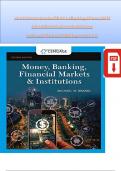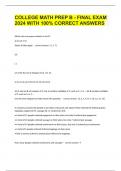SOLUTION6MANUAL6for6MONEY,6Banking,6Financial6M
arkets6&6Institutions62nd6Edition6
by6Brandl6Michael,6All6Chapters616-624
,TABLE6OF6CONTENTS6
Part6I:6MONEY6AND6ITS6PRICES.
1.6Introduction6and6Overview.
2.6Money,6Money6Supply6and6Interest.
3.6Bonds,6Loanable6Funds6&6Interest6Rates.
4.6Interest6Rates6in6More6Detail.
Part6II:6MONEY6AND6OVERALL6ECONOMY.
5.6Financial6Markets6through6Time.
6.6Aggregate6Supply6&6Aggregate6Demand.
7.6Banks6and6Money.
Part6III:6CENTRAL6BANKS.
8.6Central6Banks.
9.6Monetary6Policy6Tools.
10.6The6Money6Supply6Process.
11.6Monetary6Policy6&6Debates.
Part6IV:6THE6BANKING6SYSTEM.
12.6Bank6Management.
13.6Bank6Risk6Management6&6Performance.
14.6Banking6Regulation.
Part6V:6FINANCIAL6MARKETS.
15.6Money6Markets.
16.6Bond6Markets.
17.6Stock6Market6&6Efficiency.
18.6Mortgage6Market.
Part6VI:6GLOBAL6FINANCIAL6MARKETS.
19.6FX.
20.6Global6Financial6Architecture.
Part6VII:6FINANCIAL6INSTITUTIONS.
21.6Thrifts6and6Finance6Companies.
22.6Insurance6and6Pensions.
23.6Mutual6Funds.
24.6Investment6Banks6and6Private6Equity.
, CHAPTER62:6Money,6Money6Supply,6and6Interest
2-1 Section6Review
1. What6is6the6difference6between6money6and6currency?6When6are6they6the6same?6Why6might6they6be6di
fferent?
ANS:6Money6is6anything6generally6accepted6in6exchange6for6goods6&6services.6Currency6is6issued6by6a6b
ank6or6the6government,6but6currency6is6not6necessarily6money.6They6are6the6same6when6they6are6accep
ted6in6exchange6for6goods6and6services.6Currencies6can6stop6being6money6if6people6don’t6accept6them6in
6exchange6for6goods6and6services.6If6a6group6of6people6stop6using6currency6to6get6goods6and6services6b
ut6instead6use6bananas,6then6the6bananas6are6the6money.
2. How6many6prices6must6a6barter6economy6have6if6the6economy6has6four6goods?6What6if6it6has64006
goods?6Explain6why6having6a6money6in6the6second6case6is6beneficial.
ANS:646goods6=666prices;64006goods6=679,8006prices.6Money6allows6us6to6specialize6and6reduce6our6sear
ch6cost.6 Money6allows6us6to6reduce6the6number6of6stated6prices6we6need.
3. You6read6a6news6story6about6a6country6that6is6suffering6from6rapid,6ongoing6increases6in6the6cost6of6
living.6Which6characteristic6of6money6is6being6directly6negatively6impacted6in6that6economy?
a. Unit6of6account
b. Medium6of6exchange
c. Store6of6value
d. Double6coincidence6of6wants6
ANS:6C
2-2 Section6Review
1. Bobby6is6confused.6He6states:6“Since6prisoners6are6not6allowed6to6smoke6in6prisons6any6longer,
Radford’s6examples6of6cigarettes6in6POW6camps6no6longer6applies.”6How6would6you6explain6to6Bobby6h
ow6Radford’s6story6demonstrates6the6concepts6of6the6criteria6of6money,6as6well6as6the6importance6of6cha
nges6in6the6money6supply?
ANS:6Any6asset6that6is6able6to6be6standardized,6divisible,6durable6and6in6demand6could6be6currency,6as6l
ong6as6it6is6a6medium6of6exchange,6is6a6unit6of6account6and6has6store6of6value.6 Cigarettes6were6money.
, 2. Proponents6of6the6Gold6Standard,6or6using6gold6as6money,6often6argue6that6it6will6keep6inflation6under6
control.6How6does6the6experience6of6Europe6in6the6sixteenth6century6raise6doubts6about6that6claim?
ANS:6If6people6start6to6hoard6gold6or6silver,6there6may6not6be6enough6money,6and6an6economy6could6s
lide6into6recession.6 If6gold6or6silver6increases6too6rapidly6the6economy6could6suffer6inflation.
3. Ricardo6and6Friedman6agree6that6if6the6money6supply6increases6“too6quickly”6the6following6happens:
a. The6rate6of6inflation6decreases.
b. The6rate6of6real6economic6growth6increases.
c. The6rate6of6inflation6increases.
d. The6level6of6employment6decreases.
ANS:6C
2-3 Section6Review
1. A6critic6of6money6economics6once6stated,6“if6you6cannot6measure6the6money6supply6accurately,6it6is6n
ot6worth6discussing6at6all.”6How6would6you6refute6this6statement?
ANS:6Due6to6changes6in6financial6markets,6financial6innovation6and6changes6in6the6way6banks6operate,6le
d6to6the6decline6in6the6usefulness6of6M26as6a6monetary6aggregate.
2. Economists6are6searching6for6a6“good”6measurement6of6the6money6supply.6What6constitutes6a6good6me
asurement6of6the6money6supply?
ANS:6To6economists,6a6“good”6measurement6of6the6money6supply6is6one6that6conforms6to6economic6theori
es6regarding6inflation6and6the6economy.6For6example,6if6the6money6supply6(according6to6a6particular6meas
urement)6increases6faster6than6the6growth6rate6of6the6economy,6then6economic6theory6suggests6that6inflatio
n6should6occur.6On6the6other6hand,6if6the6money6supply6(according6to6a6particular6measurement)6increases
6too6slowly6relative6to6the6growth6rate6of6the6economy,6then6economic6theory6suggests6that6this6will6resul
t6in6a6recession.6When6the6measurement6of6the6money6supply6coincides6with6these6economic6predictions,6t
hen6that6particular6measurement6has6the6potential6to6be6a6“good”6measurement6of6the6money6supply.6Duri
ng6certain6periods6of6time,6both6M16and6M26have6been
considered6to6be6“good”6measurements6of6the6money6supply.6However,6there6have6also6been6periods6of6tim
e6where6the6changes6in6M16or6M26did6not6coincide6with6economic6theory.
3. Which6of6the6following6is6the6broadest6or6most6inclusive6measurement6of6the6money6supply?
a. M1
b. M2
c. M3
d. M0
ANS:6 B





